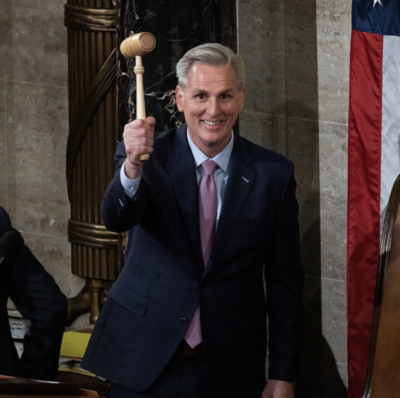2023 has been a year to forget for the House of Representatives.
On January 3, at the opening of the 118th United States Congress, the newly elected members of the House held an election for its speaker. With incumbent speaker Nancy Pelosi retiring as House Democratic leader and the Democratic Party losing their slim majority during the 2022 midterm elections, Republican Representative Kevin McCarthy of California, the former House Majority Leader, was widely expected to become speaker.
Yet while McCarthy had been nominated for the speakership by the House Republicans, the election itself was not so easy. As a result of staunch opposition from within his own party, he did not attain speakership on the first ballot on January 3. Nobody did. For the next four days and the next thirteen ballots of voting, the House of Representatives could not elect a speaker.
While, after making political concessions before the unprecedented fifteenth ballot, McCarthy did eventually secure the slim majority necessary for the speakership, this saga is illustrative of the critical problem facing the American government today. Regardless of party or ideology, politics is being placed over the wellbeing of the American people.
From the lack of compromise during the debt ceiling crisis to the endless stream of controversy surrounding Representative George Santos, now expelled, Congress has been racked with scandals and political inaction since the New Year. Even McCarthy, as we now know, did not remain speaker for long, having been ousted for his compromise to avoid a government shutdown on October 3. Even in the Senate, corruption charges have been against Senator Bob Menendez, and threats of violence almost caused a fistfight in the middle of a hearing.
Now of course, political scandals are no new phenomenon. No government is perfect. But it seems as if, moreso than in any time in recent memory, Congress has shown an overt and explicit disregard for the concerns of their constituents.
This has been exemplified in the continuation of the House Speaker saga following McCarthy’s ouster. From October 3 to October 25, the House was without a Speaker, with Republicans pivoting from candidate to candidate without resolution. In nations with parliamentary democracies, in which the power of the executive derives from the legislature itself, it is not uncommon for the formation and dissolution of a government to occur relatively frequently. But in America, in a time of geopolitical uncertainty and turmoil, the devotion of congressional time to such meaningless politicking indicates that our elected officials do not believe there is a single more important issue they could be addressing.
Perhaps if we lived in a time of everlasting peace and universal prosperity, a time in which the welfare and security of the American people and the world were not a pressing concern, an inept Congress would be tolerable. Of course, we do not live in such a time.
Another fact is also evident: non-partisanism is dead. From the only temporary resolutions to the debt ceiling crisis and a potential government shutdown to the prolonged farce of the speakership vote, cooperation and collaboration between Republicans and Democrats seem more scarce than ever, limited only to the aversion of the most extreme of crises.
The manner in which the House has conducted its affairs also deserves scrutiny. Some of the nation’s most powerful politicians have resorted to ludicrous, clownish behavior. McCarthy himself was recently caught elbowing a fellow representative, presumably as revenge for voting for his removal as speaker.
Regardless of political leanings or ideology, one thing is certain: the United States government needs to start placing the needs of the people over politics and their petty squabbles.

